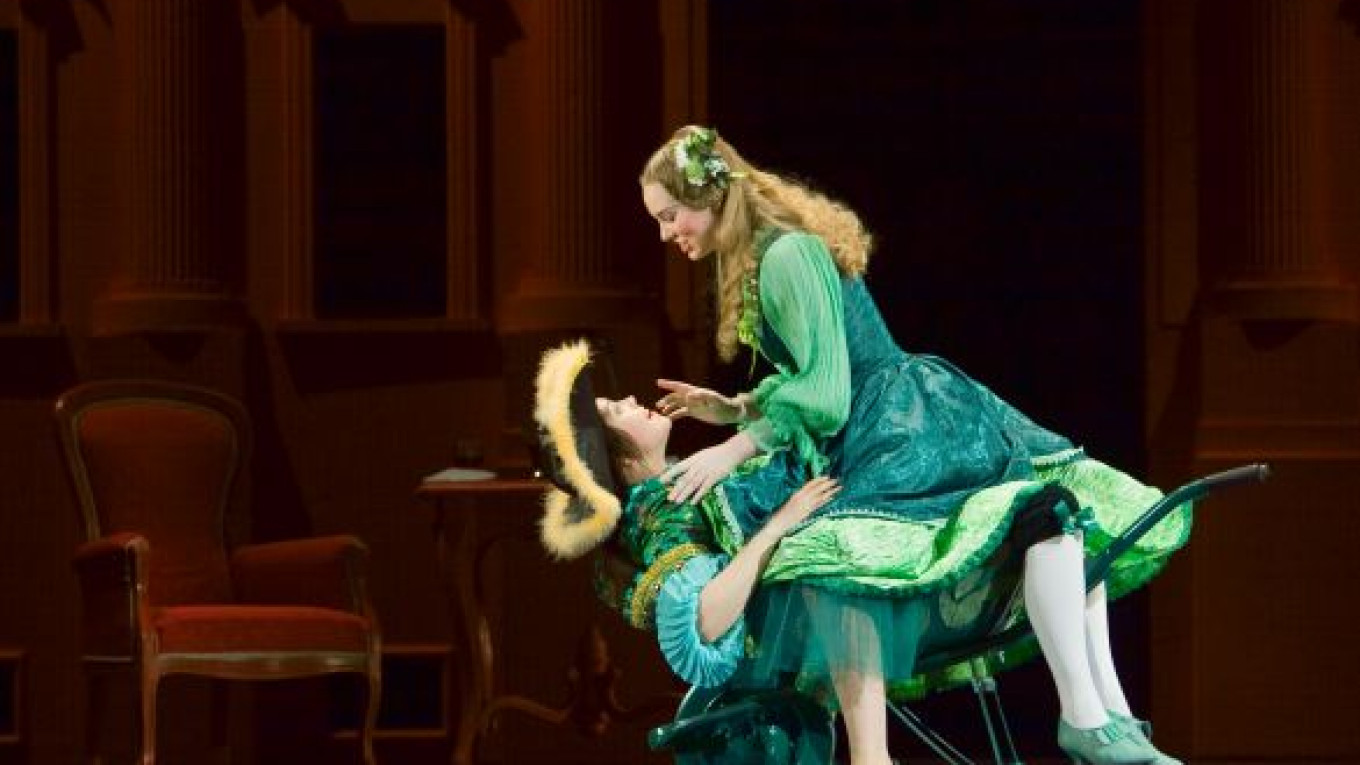This year’s Golden Mask theatrical awards festival, which officially begins on March 27, has come up with a bumper crop of 11 nominees for best opera production of the 2008-2009 season. Unfortunately, for various technical reasons and because of a shortage of available venues, Moscow audiences are
being treated to only seven of them.
Three nominations — for Wolfgang Amadeus Mozart’s “The Marriage of Figaro” and “Idomeneo” and a triple bill of new operas by three different composers based on stories by Nikolai Gogol, called “Gogoliada” — have gone to St. Petersburg’s Mariinsky Theater, a five-time past winner of a Golden Mask for best production of opera. In addition, five participants in the three productions have received individual nominations. “The Marriage of Figaro” played in Moscow early last month, but neither of the other two productions is scheduled for an appearance here.
Despite having one less nominated production than the Mariinsky, Moscow’s own Stanislavsky and Nemirovich-Danchenko Musical Theater is the clear-cut winner of this year’s Golden Mask opera nomination sweepstakes. In addition to having in contention its productions of Vladimir Kobekin’s “Hamlet (Danish) (Russian) Comedy” and Gaetano Donizetti’s “Lucia di Lammermoor,” no fewer than 14 participants in one or another of those productions have received individual nominations.
The Novosibirsk Theater of Opera and Ballet is also the recipient of two nominations for best production of opera — Giuseppe Verdi’s “Macbeth” and Alexander Borodin’s “Prince Igor” — and six participants have been singled out for individual nominations. Neither production is being presented in Moscow.
Moscow’s third contender for the best production of opera award is Novaya Opera’s staging of Giacomo Puccini’s one-act comic masterpiece “Gianni Schicchi.”
The other nominees are Mozart’s “Don Giovanni,” from the St. Petersburg Opera, a second version of the same composer’s “The Marriage of Figaro,” from the Yekaterinburg Theater of Opera and Ballet, and a new work by composer Alexander Tchaikovsky, titled “One Day in the Life of Ivan Denisovich” and based on Alexander Solzheni-
tsyn’s novel of the same name, from the Perm Theater of Opera and Ballet.
Overall, the Golden Mask is fielding what appears to be a much stronger group of operatic contenders than it did a year ago. My guess would be that the winner for best production is likely to be chosen from among Kobekin’s wild and wonderful updating of Shakespeare’s “Hamlet” at the Stanislavsky and Nemirovich-Danchenko, the same
theater’s elegantly staged and sung “Lucia di Lammermoor” and the Novosibirsk “Macbeth,” a co-production with the Paris Opera that boasts the same director/conductor team of Dmitry Chernyakov and Teodor Curentzis that so successfully brought Alban Berg’s opera “Wozzeck” to the Bolshoi last November — though perhaps the Mariinsky’s “Idomeneo” and the Alexander Tchaikovsky opera from Perm have an outside chance at the prize.
Eight productions have been nominated for best production of ballet, among them two stunning one-act ballets from Moscow theaters, Leonid Desyatnikov’s “Russian Seasons” from the Bolshoi Theater, with choreography by the theater’s much-missed former ballet artistic director, Alexei Ratmansky, and “Na Floresta,” a work by master Spanish choreographer Nacho Duato, from the Stanislavsky and Nemirovich-Danchenko. Also among single-act ballet nominees are two from the Novosibirsk Theater of Opera and Ballet: George Balanchine’s “Who Cares?” to music by George Gershwin, and “Immortal Beloved,” choreographed by Taiwanese-American Edward Liang to music by Philip Glass.
The other four ballet nominees are all full-length productions: from the Perm Theater of Opera and Ballet, “Medea,” originally created for the San Francisco Ballet by Yury Posokhov (choreographer of the Bolshoi’s current version of Sergei Prokofiev’s “Cinderella”) and set to music by Maurice Ravel; from the Mariinsky, Roland Shchedrin’s “The Little Hump-Backed Horse,” choreographed by Ratmansky and already given its Moscow Golden Mask performance earlier this month; from the Musical Theater of the Republic of Karelia, in Petrozavodsk, Prokofiev’s “Romeo and Juliet,” choreographed by Kirill Simonov; and from St. Petersburg’s Boris Eifman Ballet Theater, “Onegin,” created, like all of the theater’s repertoire, by the choreographer whose name it bears.
The two Ratmansky ballets and Duato’s “Na Floresta” look like the strongest contenders for best production of ballet. But considering the unpredictability of past Golden Mask juries, a surprise winner could well emerge from among the other five.
Finally, a note concerning the award for best operetta or musical. Among the nominees in that category is the Stanislavsky and Nemirovich-Danchenko’s “Evening of Classical Operetta,” with two of its participants also nominated for individual awards. Those nominations, added to the others for opera and ballet, bring the theater’s total to 20. A search of the Golden Mask festival archives seems to indicate that no theater has ever before received such a number at any of the 16 festivals to date.
? For Golden Mask festival tickets and information, call 755-8335 or log on to www.goldenmask.ru.
A Message from The Moscow Times:
Dear readers,
We are facing unprecedented challenges. Russia's Prosecutor General's Office has designated The Moscow Times as an "undesirable" organization, criminalizing our work and putting our staff at risk of prosecution. This follows our earlier unjust labeling as a "foreign agent."
These actions are direct attempts to silence independent journalism in Russia. The authorities claim our work "discredits the decisions of the Russian leadership." We see things differently: we strive to provide accurate, unbiased reporting on Russia.
We, the journalists of The Moscow Times, refuse to be silenced. But to continue our work, we need your help.
Your support, no matter how small, makes a world of difference. If you can, please support us monthly starting from just $2. It's quick to set up, and every contribution makes a significant impact.
By supporting The Moscow Times, you're defending open, independent journalism in the face of repression. Thank you for standing with us.
Remind me later.


